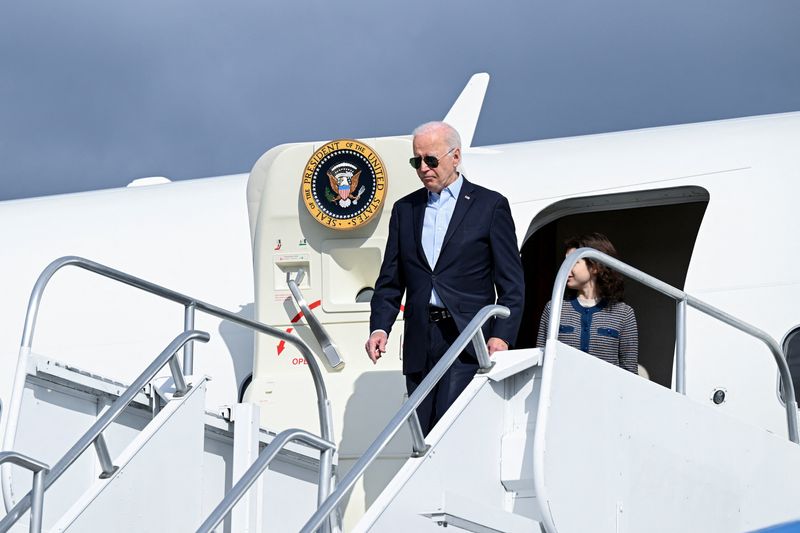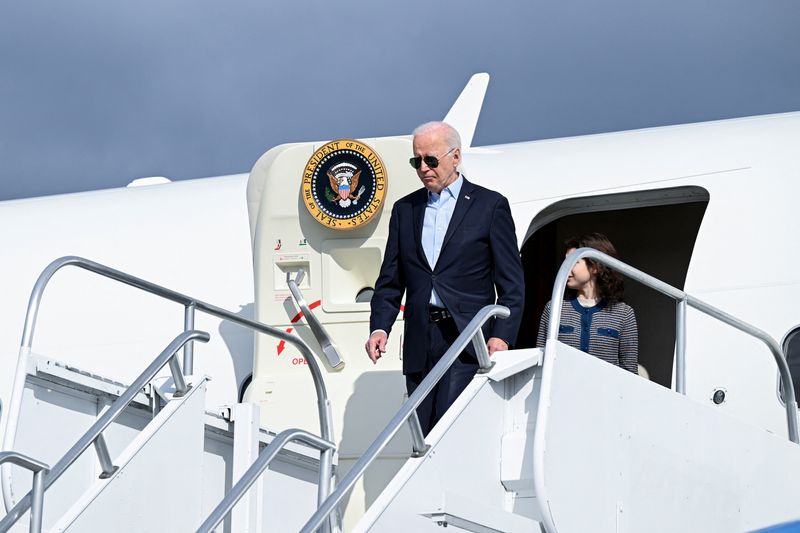Stock Markets
Biden makes final campaign stop for Harris in Scranton, his childhood hometown

By Jeff Mason
SCRANTON, Pennsylvania (Reuters) – Barack Obama once said if there were no Scranton, Pennsylvania, there would be no Joe Biden.
The sitting president, whose term ends in January, returned to his childhood hometown on Saturday for a final campaign stop in support of Vice President Kamala Harris, seeking to use his sway in a critical part of an important swing state to help her beat his onetime rival, Republican Donald Trump.
Scranton has a storied history for Biden, and if he were still at the top of the Democratic ticket, a stop here would likely be seen as a full-circle moment for his final campaign.
Instead it was Biden’s swan song of sorts for his No. 2, and a muted one at that.
The president rallied union workers, a constituency with whom he is popular, in the town where he grew up before his family moved to Delaware, where he would launch his more than fifty-year political career.
“I’m so proud to be back,” Biden said, launching into familiar remarks about his and Harris’ support for unions, his pride in having been the first president to walk a picket line, and their efforts to restore pensions.
“Don’t forget where you came from,” he said to applause, warning of the ramifications if Trump were elected and did away with the Affordable Care Act healthcare program.
Biden, who stepped aside as the Democratic Party’s standard bearer in July following a disastrous debate performance against Trump, has not been a regular feature on the campaign trail for Harris since she ascended to the top of the ticket.
They held a handful of early events, both official and campaign-related, as she took the baton and energized demoralized Democrats in the summer. But his former campaign largely left him in the shadows since, amid concerns about his age, his penchant for gaffes, and his low approval ratings with the American public.

The wisdom of that strategy was highlighted earlier this week when Biden’s call with a Latino group in which he referred to a Trump supporter or supporters as garbage partially overshadowed Harris’ well-received closing argument speech to tens of thousands of supporters in Washington. He later clarified his remarks, but the episode was an unwelcome one for Harris and her team in the closing stretch of the race.
It was not enough, however, for them to ask Biden to eschew his stop in Pennsylvania, where he spoke at a union get-out-the-vote meeting with Carpenters Local 445, standing in front of a wall of signs that said “Harris for President” and “Thank you, Joe.”
Stock Markets
Suburban Propane director Logan sells $139k in shares
Stock Markets
Stock market today: S&P 500 closes lower, but posts big weekly win
Stock Markets
TD Bank promotes Laura Nitti to retail market president role

 Forex3 years ago
Forex3 years agoForex Today: the dollar is gaining strength amid gloomy sentiment at the start of the Fed’s week

 Forex3 years ago
Forex3 years agoUnbiased review of Pocket Option broker

 Forex3 years ago
Forex3 years agoDollar to pound sterling exchange rate today: Pound plummeted to its lowest since 1985

 Forex3 years ago
Forex3 years agoHow is the Australian dollar doing today?

 Cryptocurrency3 years ago
Cryptocurrency3 years agoWhat happened in the crypto market – current events today

 World3 years ago
World3 years agoWhy are modern video games an art form?

 Commodities3 years ago
Commodities3 years agoCopper continues to fall in price on expectations of lower demand in China

 Economy3 years ago
Economy3 years agoCrude oil tankers double in price due to EU anti-Russian sanctions





















